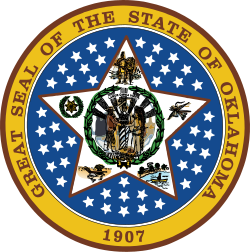| |||||||||||||||||
| |||||||||||||||||
 County results Haskell: 40–50% 50–60% 60–70% 70–80% 80–90% Frantz: 40–50% 50–60% | |||||||||||||||||
| |||||||||||||||||
| Elections in Oklahoma |
|---|
 |
The 1907 Oklahoma gubernatorial election was held on September 17, 1907, and was the inaugural race for Governor of Oklahoma. Democrat Charles N. Haskell defeated Republican Frank Frantz, the territorial governor. Also on the ballot was C. C. Ross of the Socialist Party. [1]
Contents
Oklahoma joined the Union as the 46th state on November 16, 1907. Haskell and all other new state officers elected at this general election took office on that date.

